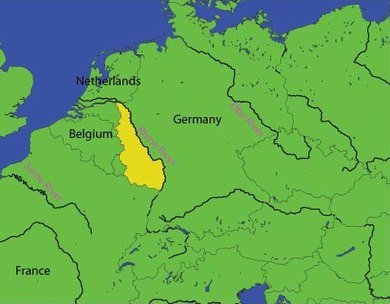On March 7, 1936, Adolf Hitler made a daring move that would have far-reaching consequences for Europe and the world. He ordered German troops to march into the Rhineland, a demilitarized zone established by the Treaty of Versailles after World War I. This act of aggression was a direct violation of the peace terms imposed on Germany and a clear challenge to the European balance of power.
The Treaty of Versailles, signed in 1919, was meant to ensure lasting peace in Europe after the devastation of World War I. One of its provisions was the demilitarization of the Rhineland, a region bordering France and Belgium. The purpose of this demilitarized zone was to serve as a buffer between Germany and its western neighbors, preventing any future aggression.
Hitler’s decision to occupy the Rhineland was a calculated risk. He knew that it could provoke a response from France and Britain, who were the guarantors of the Treaty of Versailles. However, he also believed that these countries would not risk another war so soon after the Great War. Hitler’s gamble paid off, as neither France nor Britain took any action to stop the occupation.
The lack of opposition from the international community emboldened Hitler and bolstered his belief in the weakness of his adversaries. It also allowed him to test the waters and gauge their reaction to his aggressive policies. This occupation of the Rhineland was a significant step in Hitler’s plan to expand German territory and establish dominance in Europe.
The occupation of the Rhineland was met with mixed reactions. Some Germans saw it as a rightful reclaiming of their territory, while others were apprehensive about the potential consequences. Internationally, there was concern about Hitler’s blatant disregard for the Treaty of Versailles and the potential for further aggression.
The occupation of the Rhineland marked a turning point in European history. It was a clear signal that Hitler was willing to challenge the established order and pursue his expansionist ambitions. This move set the stage for further acts of aggression, such as the annexation of Austria and the invasion of Czechoslovakia.
The occupation of the Rhineland also had significant implications for the balance of power in Europe. It exposed the weakness of the international community in enforcing the peace terms imposed on Germany. It also shattered the illusion of collective security, as France and Britain failed to respond decisively to Hitler’s aggression.
In hindsight, the lack of opposition to Hitler’s occupation of the Rhineland can be seen as a missed opportunity to prevent the escalation of tensions that eventually led to World War II. It demonstrated the failure of appeasement as a strategy and the need for stronger international cooperation in maintaining peace and stability.
In conclusion, Hitler’s occupation of the Rhineland in 1936 was a bold and risky move that defied the Treaty of Versailles and challenged the balance of power in Europe. The lack of opposition from France and Britain emboldened Hitler and set the stage for further acts of aggression. This event serves as a stark reminder of the consequences of appeasement and the importance of upholding international agreements to prevent future conflicts.
SEO Excerpt:
On March 7, 1936, Adolf Hitler defied the Treaty of Versailles by occupying the Rhineland, a demilitarized zone. This bold move marked a clear violation of the peace terms imposed on Germany after World War I and challenged the European balance of power. Learn more about this historic event and its implications for World War II.

